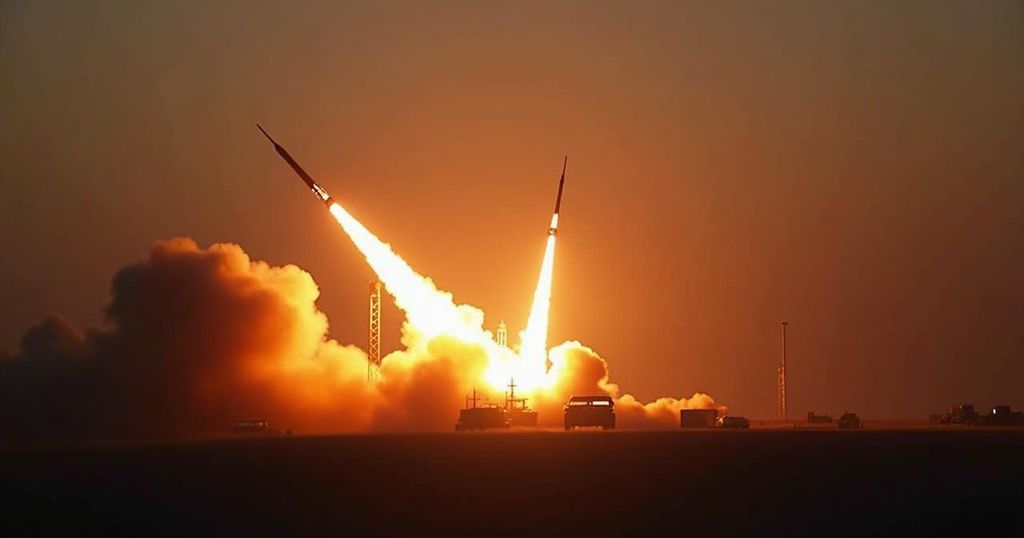Iran Launches Missile Strikes Against Israel: Regional Tensions Escalate
Iran has launched multiple ballistic missiles at Israel, with the IRGC claiming the attacks were retaliation for the deaths of Hezbollah and Hamas leaders. The Israeli military has urged citizens to shelter in place following the strikes. U.S. President Biden affirmed support for Israel amid the crisis. The situation remains volatile, with implications for regional stability.
In a significant escalation of hostilities, Iran’s Islamic Revolutionary Guard Corps (IRGC) has launched a barrage of ballistic missiles targeting Israel. According to reports by The Washington Post, citing anonymous Pentagon sources, the missile strikes did not directly target American forces stationed in the region, despite concerns over previous attacks on U.S. military bases by Iranian-linked Iraqi groups in Iraq and Syria. The missiles, reportedly fired from Iran, traversed the skies of Jordan before striking locations including Tel Aviv and East Jerusalem. The Israeli military has communicated alerts urging citizens to seek shelter, acknowledging an ongoing threat. Despite advance knowledge of potential attacks, the timing and scale of this incident caught Israeli authorities off guard, prompting a meeting of Israel’s security cabinet in a secure location in West Jerusalem. Iran’s official statements emphasize that these missile strikes were retaliation for the recent killings of key figures, including Hezbollah chief Hassan Nasrallah and Hamas leader Ismail Haniyeh. The IRGC claimed, “In response to the martyrdom of Ismail Haniyeh, Hassan Nasrallah… we targeted the heart of the occupied territories.” Furthermore, Iranian state media claimed that the missile attacks have concluded, warning against Israeli retaliation in response. In reaction to the unfolding crisis, Jordan has temporarily suspended air traffic, and Israeli Army Radio reported a halt in operations at Ben Gurion International Airport. The Israeli military has instructed personnel to remain in secure areas, clarifying that the sounds of explosions stemmed from missiles being intercepted or falling in the surrounding regions. As the situation remains tense, U.S. President Joe Biden has expressed the United States’ readiness to support Israel in defending itself from these missile threats, reiterating collaboration efforts discussed with senior White House officials. Local Israeli accounts indicate that the population is experiencing heightened anxiety, with sirens still active across areas of Tel Aviv, demonstrating the ongoing severity of the conflict. The Israeli finance minister has warned that Iran will face consequences similar to those experienced by Gaza and Lebanon. This incident marks a critical moment in the ongoing hostilities between Iran and Israel, underscoring the fragility of regional stability and the profound implications for military engagements within the Middle East.
The recent missile attack against Israel launched by Iran’s Islamic Revolutionary Guard Corps (IRGC) represents a significant escalation in the ongoing conflict involving Iran and its regional adversaries. The IRGC’s statement indicates that this military action was in direct response to the assassination of prominent leaders in the Iranian-backed groups Hezbollah and Hamas, further complicating already tense geopolitical dynamics. This incident highlights the potential for broader conflict in the region, especially with the involvement of American military forces and allies in the vicinity. The attack’s ramifications include increased military readiness and updates to air traffic protocols in neighboring countries, including Jordan. Furthermore, the ongoing response from the Israeli government and the international community underscores the urgent need for diplomatic interventions to mitigate hostilities.
In conclusion, the missile strikes from Iran on Israel constitute a pivotal escalation of confrontations in a long-standing conflict. The immediate implications of this attack have been felt through crises communication among Israeli civilians and military forces, as well as responses from the U.S. government affirming its support for Israel. The involvement of regional actors and the current geopolitical climate suggests that these hostilities may contribute to increased tensions across the Middle East.
Original Source: www.aljazeera.com




Post Comment